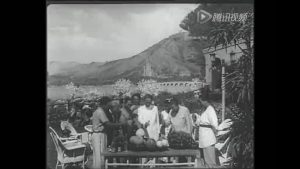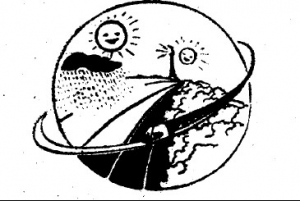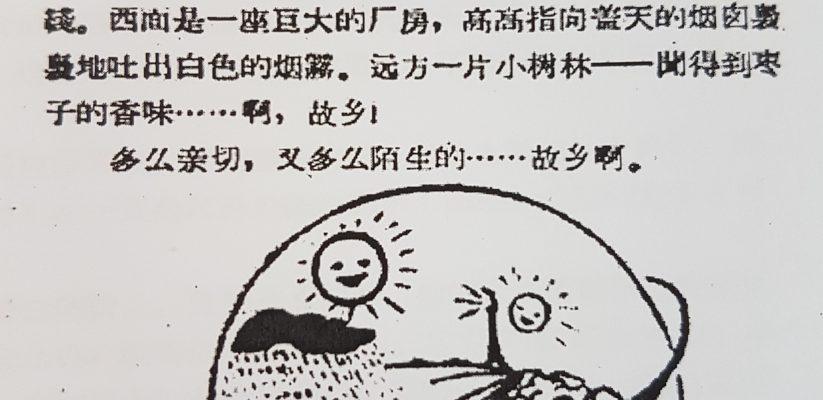Written by Jessica Imbach
The phenomenal rise of Chinese science fiction since the 1990s coincides not only with China’s transformation into the world’s second largest economy, but also growing global awareness of the environmental crisis. Several contemporary works, including the science fiction blockbuster ‘The Wandering Earth’ (流浪地球 Liulang diqiu, 2019), in fact thematise climate change and other ecological problems very explicitly (Imbach 2021). Yet, an ecological perspective is central to most science fiction media. Lawrence Buell has argued that ‘no genre potentially matches up with a planetary level of thinking ‘environment’ better than science fiction does’ (Buell 2009, 57). But what is perhaps particularly intriguing about science fiction is the ways it often ‘thinks environment’ through technology. While current debates on ‘green technology’ and ‘clean energy’ give this line of speculative imagination new urgency and relevance, science fiction also helps us locate shifting views on nature and technology in their specific historical and political contexts.
An important trope in this respect is the ‘smart village,’ which appears mainly in socialist science fiction from the 1950s and 1960s. Agricultural themes of course dominated socialist literature until the end of the 1970s. But what makes these stories about high-tech country life and bio-engineered abundance stand out from other literary texts of this period is, among other things, not only their temporal setting in the (near-)future, but also their reliance on technology to achieve the Maoist green utopia. Although some of these texts imagine advances that seem quite absurd to us today (and we should keep in mind that many of these texts were written as ‘children’s literature’), these visions of techno-pastoral utopianism continue to resonate with current articulations of state environmentalism and its promotion of ‘ecological civilisation’ (生态文明 shengtai wenming).
The most well-known smart village of the 1950s can be found in Tian Han’s play Rhapsody of the Ming Tomb Reservoir (十三陵水库畅想曲 Shisanling shuiku changxiangqu, 1958). Its last act offers a rare explicit vision of China’s socialist future as it was being envisioned in mainstream culture production during the industrialisation efforts of the Great Leap Forward. In Tian Han’s industrialised arcadia, China has found a cure for cancer and an anti-aging formula, everybody can afford folkloric silk gowns, people travel in private helicopters and ‘Beijing’ cars, there is commercial space travel and when people want to enjoy a scenic ride on the reservoir lake they have ‘atomic boats’ at their disposal. The play gained fame, as it was that same year turned into a movie directed by Jin Shan 金山, which also included live footage of Mao and other party leaders participating in the construction of the reservoir. The cinematic adaption develops a more explicit agricultural utopia by adding, for instance, a genetically engineered tree that can simultaneously produce a variety of different fruits.

Fig 1. Still from ‘Rhapsody of the Ming Tomb Reservoir,’ dir. Jin Shan, 1958
The subgenre of the scientific discovery novel captures perhaps even more vividly the unfettered scientific romanticism and techno-pastoral aspirations of the 1950s. An interesting example is Chi Shuchang’s short story ‘Elephants without Trunks’ (割掉鼻子的大象 Gediao bizi de daxiang, 1956), which centres on a farm village in the Gobi desert that has developed a method for breeding pigs the size of elephants and also produces other culinary delights such as oranges with invisible skins. Such techno-pastoral dreams were, however, not limited to remote and rural locations. For instance, Zheng Wenguang’s 郑文光 utopian vignette ‘Ode to Communism’ (共产主义畅想曲 Gongchanzhuyi changxiangqu), which was written in 1958, but describes the 30th anniversary of the People’s Republic in 1979, depicts not only a new world illuminated by a second artificial sun, but also describes how Beijing ‘is no longer a crowded and noisy city, but has become a beautiful garden’ (Zheng Wenguang 1958, 24:22).

Fig 2. Illustration accompanying ‘Ode to Communism’ (1958)
Today, these techno-pastoral narratives remind us of the large discrepancy between the utopian aspirations of the Maoist industrial revolution and its devastating humanitarian and environmental consequences. They reflect not only the Maoist idealisation of the countryside, but also an instrumental and anthropocentric view of nature as an infinite and malleable resource. However, we can trace a similar conjunction of industrial utopianism with pastoral romanticism in current articulations of state environmentalism. Xi Jinping’s ubiquitously quoted phrase ‘blue rivers and green mountains, are mountains of silver and gold’ (绿水青山就是金山银山 lüshui qingshan jiushi jinshan yinshan) may sound benign, but its poetic rhetoric belies the much more martial reality of China’s new ‘green technocracy’ and its use of technological means for environmentally unsustainable and politically coercive ends (Li and Shapiro 2020). The continued relevance of Maoist eco-utopianism is also made explicit in the conceptualisation of the current stage of socialist development with Chinese characteristics as ‘ecological civilisation,’ which, as numerous Chinese think tanks and party historians have elaborated, is seen as a continuation of Mao’s ‘industrial civilisation’ (工业文明 gongye wenming).
In contemporary science fiction, however, we can encounter a darker and more ambivalent take on techno-pastoralism. For instance, Han Song’s recently published ‘Mountain Camp’ (山寨 Shanzhai, 2020) is a mysterious fable about a group of writers and literary scholars, who go to a conference in a remote research centre in the mountains and become the only survivors of some inexplicable Armageddon event. In a certain sense, it is an allegory on the limits of literature to understand the world – the title, which in contemporary Chinese means ‘knock-off’ also alludes to the story’s play on imitation and originality – and the participants at one point bemoan the fact that no science fiction writer was invited to the conference to make sense of their absurd predicament. But the story also stages a confrontation with the techno-pastoral fantasies of the past, although in Han Song’s industrialised landscape AK47s melt into ‘warped numbers’ and dears have no skull caps and so their brain matter ‘cascades over their bodies like a waterfall.’ With technology and nature constantly shapeshifting and mutating in unpredictable and incomprehensible ways, ‘Mountain Camp’ is probably closer to Lovecraftian horror than Maoist eco-utopianism. It depicts a ‘thinking environment’ that stands in sharp contrast to the environmental thought of ‘ecological civilisation’.
i. An interview with Han Song on ‘Mountain Camp’ and a short introduction by Song Mingwei, to whom also go my thanks for graciously sending me a copy of the story, can be found here.
Jessica Imbach is a post-doc and lecturer in Chinese Studies at the University of Zurich. Her research explores the intersections of technology and environment in contemporary Chinese culture and traces how environmental narratives shuttle between scientific, literary, and political communities. She is co-editor of the upcoming volume ‘Whose Utopia: Chinese and Sinophone Explorations of the Future’ (Cambria Press) and currently editing a book on digital literature and culture in the Sinocybersphere, which is under contract with Amsterdam University Press. Featured image: Excerpt from ‘Ode to Communism’.
- TV Drama Discourse on Stay-at-home Fathers in China: Super Dad & Super Kids - January 28, 2022
- Freud and China - January 20, 2022
- “Cultural China 2020″—A Different Take on China - January 7, 2022

[…] opening piece, Jessica Imach discusses how techno-pastoral narratives from 1950 and 1960s’ Chinese science fiction […]